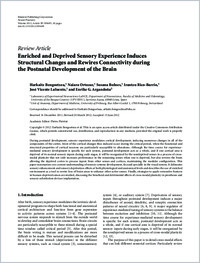Enriched and deprived sensory experience induces structural changes and rewires connectivity during the postnatal development of the brain
- Bengoetxea, Harkaitz Laboratory of Experimental Neuroscience LaNCE, Department of Neuroscience, Faculty of Medicine and Odontology, University of the Basque Country (UPV/EHU), Leioa, Spain
- Ortuzar, Naiara Laboratory of Experimental Neuroscience LaNCE, Department of Neuroscience, Faculty of Medicine and Odontology, University of the Basque Country (UPV/EHU), Leioa, Spain
- Bulnes, Susana Laboratory of Experimental Neuroscience LaNCE, Department of Neuroscience, Faculty of Medicine and Odontology, University of the Basque Country (UPV/EHU), Leioa, Spain
- Rico-Barrio, Irantzu Laboratory of Experimental Neuroscience LaNCE, Department of Neuroscience, Faculty of Medicine and Odontology, University of the Basque Country (UPV/EHU), Leioa, Spain
- Lafuente, José Vicente Laboratory of Experimental Neuroscience LaNCE, Department of Neuroscience, Faculty of Medicine and Odontology, University of the Basque Country (UPV/EHU), Leioa, Spain
- Argandoña, Enrike G. Unit of Anatomy, Department of Medicine, University of Fribourg, Switzerland
-
13.06.2012
Published in:
- Neural Plasticity. - 2012, p. 305693
English
During postnatal development, sensory experience modulates cortical development, inducing numerous changes in all of the components of the cortex. Most of the cortical changes thus induced occur during the critical period, when the functional and structural properties of cortical neurons are particularly susceptible to alterations. Although the time course for experience-mediated sensory development is specific for each system, postnatal development acts as a whole, and if one cortical area is deprived of its normal sensory inputs during early stages, it will be reorganized by the nondeprived senses in a process of cross-modal plasticity that not only increases performance in the remaining senses when one is deprived, but also rewires the brain allowing the deprived cortex to process inputs from other senses and cortices, maintaining the modular configuration. This paper summarizes our current understanding of sensory systems development, focused specially in the visual system. It delineates sensory enhancement and sensory deprivation effects at both physiological and anatomical levels and describes the use of enriched environment as a tool to rewire loss of brain areas to enhance other active senses. Finally, strategies to apply restorative features in human-deprived senses are studied, discussing the beneficial and detrimental effects of cross-modal plasticity in prostheses and sensory substitution devices implantation.
- Faculty
- Faculté des sciences et de médecine
- Department
- Département de Médecine
- Language
-
- English
- Classification
- Biological sciences
- License
- License undefined
- Identifiers
-
- RERO DOC 29729
- DOI 10.1155/2012/305693
- Persistent URL
- https://folia.unifr.ch/unifr/documents/302547
Statistics
Document views: 60
File downloads:
- arg_eds.pdf: 156
